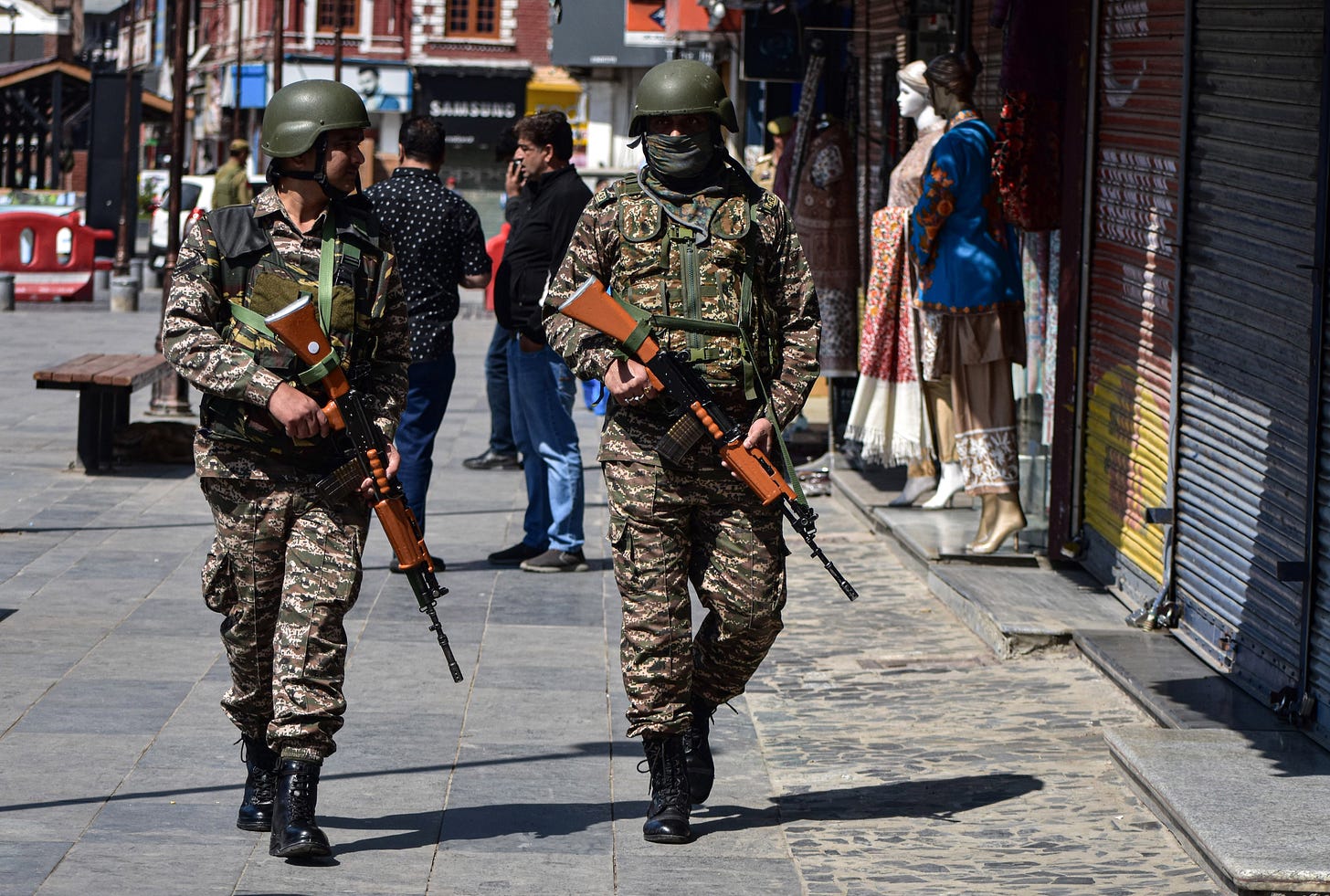India, Pakistan, and the Threat of War Over Kashmir
Is the Modi government turning towards the Israel model of warfare as it reacts to the brutal terror attack in Pahalgam?

At the end of April, 25 Indians and one Nepalese national were killed in an attack in a meadow popular with tourists near Pahalgam in Indian-administered Kashmir. The victims, all men, were shot at close range by unidentified gunmen in a popular but isolated travel spot.
Almost immediately after the attack, which India blamed on an obscure group that few had heard of until then called the “Kashmir Resistance,” Narendra Modi’s government pointed the finger at Pakistan, saying it was behind the deadly ambush, though it offered no evidence or credible claims for Islambad’s supposed involvement. While former dictator and President Pervez Musharraf said Pakistan turned a “blind eye” towards the formation of militant groups, officially, Pakistan has long rejected India’s accusations about their role in Kashmiri militancy; recently, the government denied any role in the Pahalgam attacks and offered to cooperate with “any neutral, transparent, and credible investigation,” but Modi and his cronies were having none of this diplomacy nonsense. This trigger-sensitive tension is not new; India has long accused Pakistan of funding and arming militancy in Kashmir. Pakistan has always denied the claims.
In the aftermath of Pahalgam, India proceeded to cancel visas of Pakistani nationals living in India, separating mothers from children in heart-rending scenes at the border, expelled diplomats, closed the Attari land border, and unilaterally suspended the Indus Water Treaty, an essential water-sharing agreement between the two nuclear-armed nations that has no suspension clause. Modi promised to chase the culprits to “the ends of the Earth,” his commerce minister scolded India’s 1.4 billion citizens and said unless they made “nationalism and patriotism their supreme duty, these types of incidents will continue to trouble the country” (making Pahalgam their fault and Pakistan’s in some manifestation of magical/psychic coordination), and the minister of resources promised to ensure “not a single drop of water” would flow from India to Pakistan. Modi granted India’s military “operational freedom” going forward, both countries tested missiles, and there was firing and shelling across Kashmir’s Line of Control. For its part, Pakistan responded in kind while also closing its airspace and suspending trade with India.
In a largely sycophantic corporate media environment, few Indian outlets have been able to ask how the Pahalgam attack could have occurred in a zone that has one of the largest security force deployments in the world. Or why were tourists allowed into the isolated meadows near Pahalgam? Or what proof does the state have to back up its incendiary claims? India is not unique in blaming its neighbor for terror attacks. In March, across the border, the Jaffer Express, a passenger train traveling between Quetta and Peshawar, was hijacked. Gunmen purporting to be part of the Balochistan Liberation Army held hundreds of passengers hostage, and it took Pakistan’s security forces nearly two days to end the terrifying hijacking. Pakistan has long blamed India for roiling tensions in Balochistan and suggested that the Jaffer Express attack was the work of “regional adversaries.”
Yet Modi’s anti-Pakistani war drums have been played so incessantly and so tunelessly over his interminable rule that whatever threatening power they might have once had has long since faded. Now, they are simply noisy and irritating. But unfortunately, with global consequences.
Textbook Subjugation
India’s brutalization of Kashmir is not a matter of which part of the border you belong to; it is textbook occupation and subjugation. Though it is claimed by both India and Pakistan, Kashmir is divided between both countries. While there’s no recent polling, data in the past has shown that a plurality of Kashmiris want independence and full autonomy as a people. Indian-held Kashmir is one of the most militarized zones in the world, with India deploying up to 1 million troops in the region. Indian troops in Kashmir operate under the Armed Forces Special Powers Act (AFSPA), giving them the authority to conduct raids and searches without warrants, carry out mass arrests on negligible grounds, and shoot-to-kill with little if any consequences; essentially, the AFSPA grants the Indian army total impunity in Kashmir. Human rights groups, including Amnesty and Human Rights Watch, have consistently recorded India’s use of torture, rape, and human shields in Kashmir.
While India has long focused on “terror,” which it blames exclusively on Pakistan, it has done so largely to avoid “occupation” being a part of the discourse about Kashmir. In August 2019, seemingly out of the blue, without any consultation from Kashmir, Modi revoked parts of a constitutional provision that gave Kashmir a special status that afforded the region a certain degree of autonomy and prevented it from being settled by Indians from the rest of the country. If the articles of ascension were rendered null and void by Modi’s government, then logically speaking, so too was Kashmir’s place in the Indian Union. Immediately after Modi’s abrogation – a long-standing dream of the Hindu right that he serves – Kashmir was placed under an internet and phone blackout that was the longest internet shutdown in a democracy, thousands of Kashmiris were arrested and held incommunicado including politicians, and thousands of Indians were encouraged to settle in Kashmir and given residency cards in an effort to alter the demographics and finally end the region’s Muslim majority.
Today, it is New Delhi that decides Kashmir’s fate, reducing its state government to window dressing. Just two weeks before the Pahalgam attacks, a security meeting held in the Kashmiri city of Srinagar and chaired by Modi’s right-hand man, Home Minister Amit Shah, did not include Kashmir Chief Minister Omar Abdullah.
The Pahalgam tragedy is not significant for India’s jingoism – which has become sadly commonplace in a country where “news influencers,” infamous troll farms, and viral WhatsApp groups dominate the information space. Indians have posted pictures of Gaza’s Rafah reduced to rubble on X, promising that is what will happen to Pakistan’s Rawalpindi next. Since the Pahalgam attack, Kashmiri students and young Muslim men have been harassed and beaten across India, with images of their wounds shared across social media. A daily wage laborer who reportedly shouted “Long live Pakistan” at a local cricket match in Karnataka was reportedly lynched earlier this week. In northern India’s Uttar Pradesh, a 15-year-old Muslim schoolboy was manhandled by a mob and forced to urinate on a Pakistani flag. In the video that went viral on social media, police can be seen watching as the child was abused. He had nothing to do with Kashmir or Pahalgam but was simply an example of how Muslims are routinely treated in Modi’s India.
More than 2,000 Kashmiris have been arrested in sweeping raids, and politicians are threatening Pakistan with bloody war on an hourly basis. Most recently, a Karnataka Minister belonging to the Congress Party swore that he was ready to wear a “suicide bomb…and go to Pakistan.” Never mind that the last time our two countries faced such tension, ahead of the Indian elections of 2019, India’s chest-thumping resulted in airstrikes that India swore had killed “large numbers” of Pakistani terrorists, but Pakistani journalists showed at maximum, India had hit an uninhabited forest. It also saw the downing of an Indian jet over Pakistan and the capture of an Indian Air Force pilot who was reportedly treated to tea by the Pakistani army.
The Israel Model of Warfare
Pahalgam is significant for India’s turning to what can safely be described as the Israel model of warfare. Under Modi, India has become the largest buyer of Israeli weaponry in the world, and right-wing Indian troll farms have done much of the online warring for Israel over the last year and a half. The group blamed for the Pahalgam attack, the Kashmir Resistance, also known as the Resistance Front, has “unequivocally” denied responsibility. They called a social media post on one of their digital platforms claiming their involvement “a familiar tactic in the Indian state’s digital warfare arsenal…and part of an orchestrated campaign to malign the Kashmiri resistance.” Modi’s government was reportedly an enthusiastic purchaser and user of Israeli spyware and was a major name in the Pegasus scandal of 2021.
Ever ready to make everything about themselves, Israel’s ambassador to India was quick to compare Pahalgam to the Oct. 7 attacks on Israel, and claimed without any substantiation that Hamas was traipsing around Kashmir on the Pakistani side of the border. Without much delay, India demolished the homes of at least 10 suspects, only two of whom were named by the police as part of their investigation, and raided over 1,000 homes. Collective punishment in this manner is a hallmark of Israel.
However, India’s contempt for international protocols is perhaps the biggest takeaway of its new Israeli style of statecraft. The Indus Water Treaty has no exit clause; it is not suspendable. Both India and Pakistan get water from three rivers each, all from the Indus basin. The Ravi, Beas, and Sutlej, three eastern rivers, feed India, while the western Indus, Jhelum, and Chenab rivers deliver 80% of the water required for Pakistan’s agricultural needs. Beyond the fact that the treaty, brokered by the World Bank in the 1960s, has survived wars and more serious conflicts between the two countries, Pakistan is water-stressed, and India’s threatened actions would affect millions of people. In response, Pakistan has suspended the 1972 Simla Agreement, which demarcated a line of control between Pakistan and India in Kashmir, creating a de facto border. India doesn’t have the hydroelectric infrastructure to back up its threats, but still, if states can opt out of treaties based on whim and fury, we enter a lawless and vindictive future in which diplomacy will have no power against force.
Many have warned that Israel’s flagrant shredding of international protocols and basic human rights norms in Gaza would have grotesque international consequences. Look no further than India today for a vision of what that precarious future might include: fundamental resources held hostage, nuclear-armed states operating without the safeguards of bilateral agreements, and Whatsapp forwards replacing a qualified and responsible fourth estate.
Fatima Bhutto is an award-winning author and journalist. Her most recent books include the novel The Runaways and her non-fiction reportage New Kings of the World. She recently hosted Reframe, a four-part series on the genocide in Gaza, on Al Jazeera.
Make sure you’re signed up to receive ‘The Global South with Fatima Bhutto’ to get all of her columns in your inbox.
The views expressed in this article are the author’s own and do not necessarily reflect those of Zeteo.
Check out more from Zeteo:






Fascist Hindus and Zionist Jews have both many things in common; hatred for Muslims, occupation of others lands and most common is their lust for genocides. All the while the Muslim world is ruled by the most corrupt rulers imposed by the Zionist Jews and Americans
Israelization of the BJP is not new. It suits the Modi government. Let us not forget the Security meetings a couple of weeks before this operation, maybe it was a false flag operation, as the IDF might have suggested.
There are many similarities between the actions of the Israelis in Palestine and the Indian government's position/actions in Kashmir.
We cannot hope that either India or Israel will follow international laws, as both have flouted many UN resolutions.